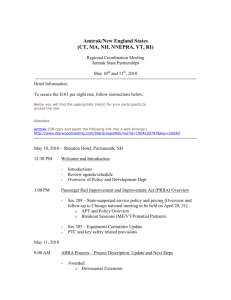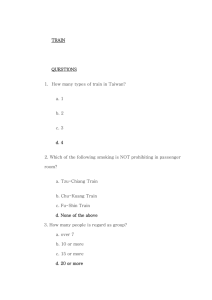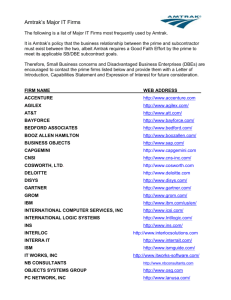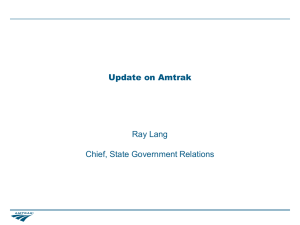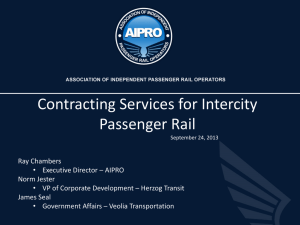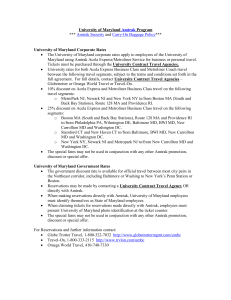a PDF of the Publication
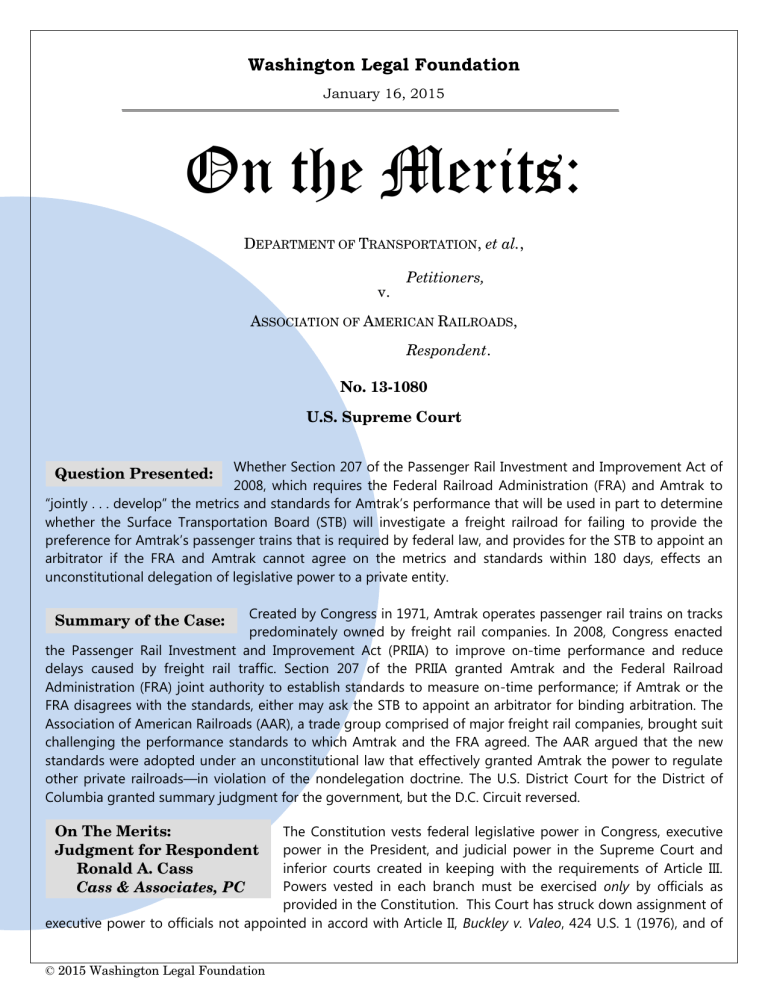
Washington Legal Foundation
January 16, 2015
On the Merits:
D
EPARTMENT OF
T
RANSPORTATION
, et al.
,
Petitioners, v.
A
SSOCIATION OF
A
MERICAN
R
AILROADS
,
Respondent .
No. 13-1080
U.S. Supreme Court
Question Presented:
Whether Section 207 of the Passenger Rail Investment and Improvement Act of
2008, which requires the Federal Railroad Administration (FRA) and Amtrak to
“jointly . . . develop” the metrics and standards for Amtrak’s performance that will be used in part to determine whether the Surface Transportation Board (STB) will investigate a freight railroad for failing to provide the preference for Amtrak’s passenger trains that is required by federal law, and provides for the STB to appoint an arbitrator if the FRA and Amtrak cannot agree on the metrics and standards within 180 days, effects an unconstitutional delegation of legislative power to a private entity.
Summary of the Case:
Created by Congress in 1971, Amtrak operates passenger rail trains on tracks predominately owned by freight rail companies. In 2008, Congress enacted the Passenger Rail Investment and Improvement Act (PRIIA) to improve on-time performance and reduce delays caused by freight rail traffic. Section 207 of the PRIIA granted Amtrak and the Federal Railroad
Administration (FRA) joint authority to establish standards to measure on-time performance; if Amtrak or the
FRA disagrees with the standards, either may ask the STB to appoint an arbitrator for binding arbitration. The
Association of American Railroads (AAR), a trade group comprised of major freight rail companies, brought suit challenging the performance standards to which Amtrak and the FRA agreed. The AAR argued that the new standards were adopted under an unconstitutional law that effectively granted Amtrak the power to regulate other private railroads—in violation of the nondelegation doctrine. The U.S. District Court for the District of
Columbia granted summary judgment for the government, but the D.C. Circuit reversed.
On The Merits:
Judgment for Respondent
The Constitution vests federal legislative power in Congress, executive power in the President, and judicial power in the Supreme Court and inferior courts created in keeping with the requirements of Article III.
Ronald A. Cass
Cass & Associates, PC
Powers vested in each branch must be exercised only by officials as provided in the Constitution. This Court has struck down assignment of executive power to officials not appointed in accord with Article II, Buckley v. Valeo , 424 U.S. 1 (1976), and of
©
2015 Washington Legal Foundation
judicial power to officials whose appointment or independence did not meet criteria laid out in Article III, Stern v. Marshall , 131 S. Ct. 2594 (2011). For similar reasons, we invalidated efforts to grant executive power to officials not removable by the President—or, if inferior officers, by officials who are subject to removal by the
President, Bowsher v. Synar , 478 U.S. 714 (1986); Free Enterprise Fund v. Public Company Accounting Oversight
Board , 130 S. Ct. 2138 (2010).
These decisions reflect appreciation of the importance of structural constraints on government power— especially discretionary power and most of all discretionary power over the conduct of private parties. That same understanding informed decisions invalidating as unconstitutional the assignment of discretionary rulemaking authority to executive officials without sufficient direction in law for those officials to execute legislative instructions rather than create legislative rules of their choice. See Panama Refining Co. v. Ryan , 293
U.S. 388 (1935); A.L.A. Schechter Poultry Corp. v. United States , 295 U.S. 495 (1935).
This case presents a related delegation problem requiring answers to three questions: (1) is assignment to a private entity of authority to make rules governing the conduct of other private parties permissible? (2) does Amtrak exercise such authority? and (3) is Amtrak a private entity?
Prior decisions answer the first question. Schechter Poultry dismissed the argument that giving industry groups authority to help write rules counterbalanced presidential discretion, saying it cannot “be seriously contended that Congress could delegate its legislative authority to trade or industrial associations or groups,”
295 U.S. at 537. Similarly, Carter v. Carter Coal Co.
, 298 U.S. 238 (1936), invalidated delegation of authority to some coal companies to craft rules binding on other companies, labeling it “legislative delegation in its most obnoxious form; for it is not even delegation to an official or an official body, presumptively disinterested, but to private persons whose interests may be and often are adverse to the interests of others in the same business,” id . at 311.
Carter Coal did not turn on a finding of self-interest; it was enough that rulemaking power lay in private hands. While private entities may advise official rule-makers or propose rules subject to official acceptance,
Sunshine Anthracite Coal Co. v. Adkins , 310 U.S. 381 (1940), they cannot exercise conclusive authority in framing rules that apply to others. These decisions have not been undermined by the passage of time or by subsequent cases: they follow precepts embodied in constitutional text and embraced in recent decisions. To the extent our decision in Currin v. Wallace , 306 U.S. 1 (1939), departs from these decisions, it is overruled.
Second, under § 207 of the PRIIA, Amtrak and FRA have equal authority to establish metrics and standards for on-time performance; both must agree or disagreement may be resolved by arbitration (no arbitrator is specified). Statutory provisions give weight to these metrics and standards, including potential damages remedies against other railroads owning tracks on which Amtrak trains operate for failing to give adequate priority to Amtrak (a matter related to the established metrics and standards); Amtrak’s role is essential to their formulation.
Finally, Amtrak is a private entity for these purposes. Its governing statute charters Amtrak as a private, profit-seeking entity, expressly disclaiming Amtrak as a federal “department, agency or instrumentality.”
Critically, Amtrak’s president is not appointed by the President or confirmed by the Senate—prerequisites for exercise of authority by an officer of the United States (with exceptions not relevant here). Nor are Amtrak’s employees considered employees of the United States Government.
It is true that Amtrak’s receipt of government funds and subjection to extensive government regulations support strictures such as prohibiting Amtrak from infringing constitutionally protected liberties. See Lebron v.
© 2015 Washington Legal Foundation 2
National Railroad Passenger Corp.
, 513 U.S. 374 (1995). Subjection to special restrictions , however, does not make Amtrak a government entity for enabling purposes: Amtrak’s deficit in constitutional requirements for exercising governmental power remains. Just as we have disapproved other hybrid constructions for exercising executive power (having some but not all constitutionally required attributes), as in Buckley and Bowsher , we must disapprove the arrangement here.
The judgment of the Court of Appeals is affirmed .
Dissenting View:
The D.C. Circuit erred in holding that § 207 of the PRIIA constitutes an unlawful delegation of regulatory power to a private party. The appeals court
Karen E. Torrent
Environmental Law
based its decision on two separate grounds: a complete disregard of the factors indicating sufficient governmental control over the development and
& Policy Center
implementation of the metrics and standards, and an erroneous finding that
Amtrak is a “private entity.” More specifically, the appeals court’s decision invalidating § 207 runs afoul of the plain text of the relevant statutes, the extensive and informative legislative history, and applicable case law—all of which demonstrate that Congress’s delegation of authority under § 207 of PRIIA is constitutional. For these reasons, I respectfully dissent.
First, as the Solicitor General correctly contends, the government retained sufficient control over the development, adoption, and implementation of the Amtrak-performance metrics and standards, thereby avoiding nondelegation concerns. This Court has long recognized the validity of statutes that permitted private parties to play a significant role in formulating or imposing new regulatory provisions. See, e.g
.
, Currin v.
Wallace , 306 U.S. 1 (1939); Sunshine Anthracite Coal Co. v. Adkins , 310 U.S. 381 (1940); United States v. Rock
Royal Co-op., Inc.
, 307 U.S. 533 (1939).
It has been nearly 80 years since this Court invalidated an Act of Congress on the ground that it delegated too much authority to a private party in Carter Coal . See 298 U.S. at 238. In Carter Coal, we invalidated minimum-wage and maximum–hour regulations because they were written solely by private industry without any participation by the government. Unlike Carter Coal , the Amtrak metrics and standards could not take effect without both the active participation and the independent assent of a governmental agency, the Federal Railroad Administration. Respondent has failed to distinguish § 207 of PRIIA from this precedent and it appears as though the D.C. Circuit has simply ignored it.
Moreover, the metrics and standards do not amount to the exercise of “rulemaking“ authority. The metrics and standards measure Amtrak’s performance only and may serve to establish a basis under which the
Surface Transportation Board (STB) can initiate its own investigation.
Second, Amtrak is not a “private entity” for purposes of the nondelegation doctrine. Congress created
Amtrak to avert the threatened extinction of passenger trains in the interest of “the public convenience and necessity” as a for-profit entity under Rail Passenger Service Act of 1970 (RPSA), Pub. L. No. 91-518, 84 Stat.
1327. Realizing that Amtrak would never be profitable, Congress subsequently amended RPSA in 1978 to modify the “for profit corporation” status of Amtrak to an “operated and managed as” a for-profit entity. See
Amtrak Improvement Act of 1978, Pub. L. No. 95-421, §11, 92 Stat. 923, 928. The House Committee Report plainly states that: “ This amendment recognizes that Amtrak is not a for-profit corporation .” H.R. Rep. No. 1182,
95 th Cong., 2d Sess. 15 (1978) (emphasis added).
© 2015 Washington Legal Foundation 3
Further, this Court has previously held that Amtrak “is an agency or instrumentality of the United States” for the purpose of individual rights guaranteed against the Government by the Constitution. Lebron , 513 U.S. at
394. In writing for the majority, Justice Scalia explained that Congress’s characterization of Amtrak is “assuredly dispositive of Amtrak’s status as a Government [or non-Government] entity for purposes of matters that are within Congress’s control . . . .” Id.
at 392.
Finally, as a matter of public policy, invalidating Amtrak’s metrics and standards, including on-time performance measures, thwarts the intent of Congress. In 2008, Congress enacted PRIIA, in part, because it recognized that on-time performance was critical to achieving viable national intercity passenger rail service in the United States. PRIAA requires Amtrak to achieve on-time performance level of 80% to 95%. In 2012,
Amtrak achieved its highest ever on-time performance level of 88.7% system wide, and 81.2% for long distance.
In 2013, almost immediately after the Court of Appeals issued its ruling, Amtrak’s on-time performance levels fell significantly to 69.7%, and the long distance rate fell to 41.2%, half of what it had been just 29 months earlier.
Consistent with the reasons stated above, intercity passenger rail in the U.S. should get back on track and on time. Accordingly, the judgment of the D.C. Circuit should be reversed.
The Honorable Ronald A. Cass is Dean Emeritus of Boston University School of Law, President of Cass &
Associates, PC, and Chairman of the Center for the Rule of Law, which filed an amicus brief on the merits in this case. Karen E. Torrent is Federal Legislative Director at the Environmental Law and Policy Center (ELPC); she authored ELPC’s amicus brief on the merits in this case.
O N THE M ERITS is an educational publication of the Washington Legal Foundation (WLF),
America’s premier public interest law firm advocating free enterprise principles through litigation, publications, and web-based communications. Authored by leading practitioners and legal experts, O N THE M ERITS provides a concise, timely, and substantive analysis of important pending litigation.
WLF distributes O N THE M ERITS to major print and electronic media, judges, the public, government officials, law professors, students, and business leaders.
For more information, please contact Cory L. Andrews, Senior Litigation Counsel, at
(202) 588-0302 or visit www.WLF.org.
Washington Legal Foundation
2009 Massachusetts Avenue, NW
Washington, DC 20036
© 2015 Washington Legal Foundation 4
